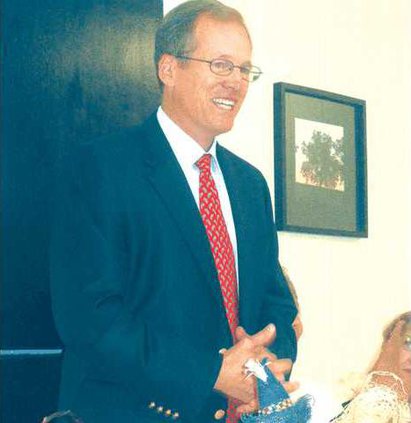As a member of the House Appropriations Committee, which is responsible for deciding how the federal budget is spent, Kingston was well-versed on federal spending and pointed in his view of its effectiveness.
His straight-forward approach and town meeting style led to an intimate and open discussion with the group of retirees, as topics of education, tax simplification and breaking the barriers of party lines were also addressed.
As a product of public schools, Kingston stressed the role teachers have in the lives of their students.
“The difference today,” he said, compared with the atmosphere of education when he was in school, “is that teachers don’t have the kind of control they used to.” There are so many things teachers are not allowed to do anymore, he said.
One result of the federal intrusion into education has been the destruction of the teacher-student relationship, he said. Although government involvement began for good reasons and right reasons, he said those reasons have “boomeranged and come back to strangle the individual board of education, and therefore the individual principal, and the individual teacher.”
There are a lot of smart people in Washington, he said, but it doesn’t matter how smart they are, they can’t control classrooms from one end of the country to the other. There is an argument for standardized testing and performance standards, he said, but they can lead to other challenges and create inflexibility.
His driving point was that the need for local control of education remains a very important reality.
Retired teachers with Social Security and teacher retirement at the forefront of their concerns were anxious to hear as Kingston voiced his desire to see federal spending cut. He referred to the country’s mounting debt as “a tsunami that affects everybody.”
For every dollar spent by the federal government, he said 40 cents is borrowed. Forty-seven percent of our national debt is borrowed from other countries, he said. He referred to China as “our No. 1 predator.”
“Our ability to deal with China is weakened when the U.S. owes them $900 billion,” he said.
In addition, Kingston said the U.S. pays China $103 million a year in foreign aid, which is not spent efficiently, he said, and a program that is not coordinated with the military.
“When you have a debt the size of ours,” Kingston said, “it’s not likely you can balance the budget without it affecting everybody somehow, someway.”
While he would support revising the U.S. tax code to a flat tax or a fair tax, Kingston said cutting taxes has historically increased revenue, and he reiterated, “We have a spending problem, not a revenue problem.”
“We have got to get spending under control,” Kingston said.
From the numerous bailouts to the abundance of federal checks paid out, there are some things Kingston said would be easy ways to say “no” to excessive spending.
Unfortunately, some people who are struggling and really trying to do their best are too often underserved by so many of the government programs, he said, while others, young, able-bodied people, think unemployment is a good idea right now, because they don’t want to work.
“We need to weed through some of the people receiving federal funding,” he said.
Steps should be taken so everyone takes some responsibility and buys into a culture where people take ownership and pay their own way, he said.
Washington knows the more people you have dependent, the more important the federal government becomes to them, he said.
“It’s a political self-perpetuation system,” he said.
One of the biggest hindrances in creating solutions for so many issues, Kingston said, is that the debates that need to happen in Washington are not happening right now.
“I think we have to start talking as a society and cross pollinating ideas,” he said.




